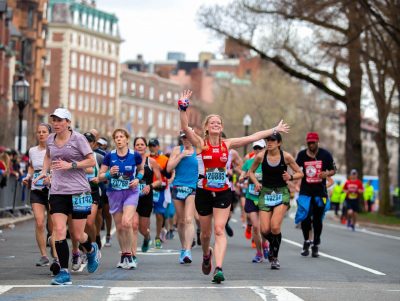Rising senior John Loftus first set his eyes on the Boston Marathon four years ago in high school. Less than two years ago, he qualified for the 2020 race. On Thursday, he realized that race will no longer happen.
The Boston Marathon has been canceled for the first time in its 124-year history, leaving Loftus among an estimated 30,000 would-be participants without a race this year.

SOPHIE PARK/ DFP FILE
Boston Athletic Association and Boston Mayor Marty Walsh announced the Marathon will not be held this year due to mounting concerns about the coronavirus pandemic. Rather, a virtual replacement will occur throughout the week of September 7-14.
The Marathon brings in more than $200 million in revenue to the city each year. Regarded as one of the most prestigious marathons in the world, it attracts about 500,000 spectators every year.
The race, originally scheduled for April 20, was postponed in March to September 14 before now being canceled altogether. Loftus, president of the Boston University Running Club, began training for the Marathon in December 2019.
When the race was first delayed because of COVID-19, Loftus said he felt “frustrated” and became doubtful the race would actually occur.
He said the decision by the Tokyo Marathon, another globally prestigious race, to allow only the top 200 runners participate set a disheartening precedent earlier this year.
“That sort of set the standard that they weren’t going to have these big races anymore for a while,” Loftus said.
Regardless, he continued training for the Boston Marathon. Loftus said he ran about 50 to 60 miles each week, mostly at or below a 6:51-minute pace per mile.
When Loftus first attained his qualifying time, he said he experienced a wide range of emotions from exhaustion to exhilaration.
“When I crossed the finish line, I saw the clock and I knew that it was fast enough,” Loftus said. “I was just super excited, because in my mind, I’d realized the dream that I had set out at the end of high school to try and run this race while I was at BU.”
Although the Marathon is allowing runners to reuse their time for next year’s race, Loftus said he is concerned his current time won’t be fast enough to keep up with an increasing competition.
“So many people apply for the race,” Loftus said, “even if you get the qualifying standard, you’re not necessarily guaranteed entry.”
The cutoff time for guaranteed participation, Loftus said, can be significantly lower than the qualifying time. For his own qualifying race, he made the cutoff by 30 seconds, despite having qualified by more than two minutes.
“So, I’m worried that with the 2021 race, if I apply, that 30 seconds won’t be there,” Loftus said.
As of now, Loftus is unsure if he will compete in the virtual race. Still, he said he hopes to one day join the 720,936 runners who have competed in the Boston Marathon throughout its history.
“This would have been my first year running it,” Loftus said, “but it definitely wouldn’t be the last.”
Though the cancellation comes as a disappointment to many athletes who have spent months training, Loftus said their love of running extends beyond the finish line.
“Most runners see it as more about the journey and not the destination,” Loftus said. “And I guess this is just a good reminder that we don’t run to cross finish lines or to get medals, but rather to just go out and have fun doing what we love.”





























































































































Ray Cooper • May 29, 2020 at 10:40 am
Great interview Johnny. Not to worry you’ll make it in 2021